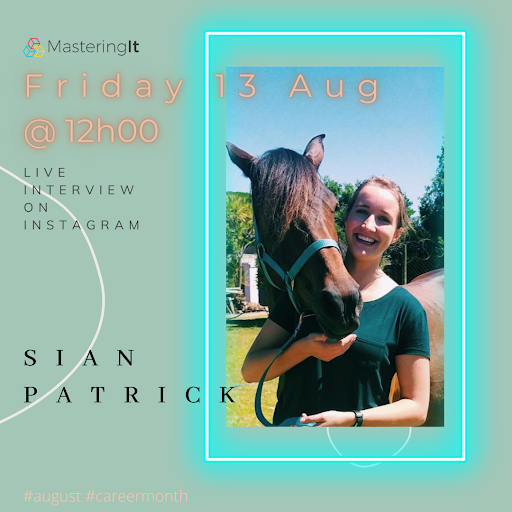Sian began her psychology career in 2015 when she began her undergrad at Stellenbosch University. After completing her undergraduate degree she undertook her Psychology Honours year, during which she became interested in the Equine-Assisted Psychotherapy field. After completing her Honours year she partook in an EAGALA training and became an EAGALA certified Equine Specialist. Sian is currently applying for the Clinical and Counselling Psychology Masters programmes at numerous South African universities.
Career tips for someone wanting to go into this career:
There are many ways of going about getting into psychology. Here are some general tips:
- First figure out which field you want to go into: Clinical, counselling, research, educational, industrial, social, child, career, sport psychology etc. This decision will inform what degree you pick or what faculty you study through.
- Research the university. Generally speaking they cover the same topics within psychology but some universities do not offer specific topics, for example, neuropsychology. This can change depending on what staff are available at that particular time.
- Volunteer. Anything is helpful but especially anything that has a social justice or counselling foundation. This is difficult as until you are registered with the HPCSA you are not actually qualified to provide counselling. An option is to obtain training with an organisation and then work as a lay counsellor for them. For example: Lifeline, Childline, FAMSA, SADAC.
- If you want to go into something specific, such as music therapy, art therapy, animal-assisted therapy, or equine-assisted therapy, start researching this and see what other courses are available outside of university.
- Check out Cognition & Co. They have an extremely helpful website for psychology students specifically made to provide information and assistance to students of all levels, from high school up to Masters, but particularly for students in the interim between Honours and Masters. They have all the information you need, plus they run mentorship programmes and post informative interviews and videos with professionals in the field.

When going about getting your psychology degree there are two main routes to consider:
- BA Humanities Undergrad (3 years) + Honours (1 year) + Clinical/Counselling Masters (3 years) It is highly likely that there will be multiple years between your Honours and Masters degrees, as it is an extremely competitive field and experience is required for application to the programme. A Psychology Honours degree does not qualify you to work in the mental health field in any way, it is simply a necessary step before your Masters.
- BPsych The BPsych degree is basically a BA in Psychology, combined with an Honours degree in Psychology, as well as a 6 month practical internship (4 years). What this means is that when a student has completed this degree they are able to register as a Registered Counsellor after successfully passing the board examination. This means you can work as a counsellor and get extremely valuable experience for Masters applications if you wish to continue your studies. However, not all universities offer this, and you would need to look up which offer HPCSA accredited BPsych degrees.
What can high school students do now?
- Start volunteering.
- Do some research into different fields of psychology to see what you are interested in.
- You can even set up appointments with psychologists to ask questions.
- There are free psychology courses online (for example: EdX introductory courses) that would give you an idea of what an undergrad syllabus would cover.
- Make sure you are at least bilingual. Any African language is a huge advantage as there is a distinct lack of isiXhosa and isiZulu speaking psychologists in South Africa and this affects how we are able to serve our communities.
- Work on your hobbies. Especially in psychology you never know, you might be able to integrate your hobby into your work in some way.
The journey to become a psychologist is a long one, but if it is something you are passionate about, it is absolutely worth it. Using the tips from this interview you can set yourself up for success, whether that is in your Master’s applications or on your path to become a counsellor.
If you’d like to watch the full interview, head over to our Facebook or Instagram page! Herewith the link: https://www.facebook.com/110023120536489/posts/375514157320716/




